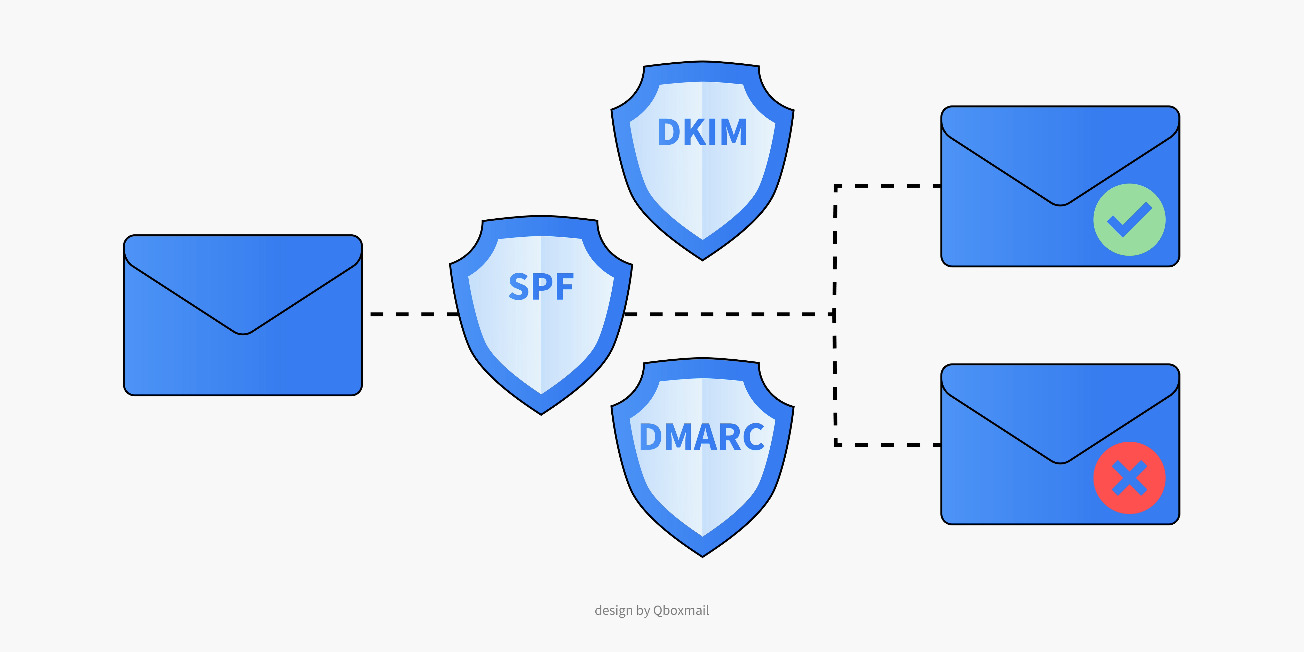Optimize your email deliverability with SPF, DKIM, and DMARC

Email Authentication Methods
Email authentication methods are technical standards that enable message verification based on the sender’s domain.
Verified elements may vary among methods but are all standardized to support the Simple Mail Transfer Protocol (SMTP), the primary protocol (in addition to APIs) used for sending emails.
Common email authentication protocols include SPF and DKIM, with others like DMARC gaining broader usage.
Leveraging email authentication and implementing the mentioned in our post requirements, present opportunities to enhance the email communication experience, add value to each recipient, and create a more reliable and efficient communication ecosystem.
Proper implementation of authentication is crucial, along with providing adequate support for the list-unsubscribe header. This allows those uninterested in receiving your messages to unsubscribe easily. Disregarding this aspect increases the risk of marking your messages as spam.
A high bounce rate or messages flagged as spam elevates the risk of compromising the IP’s reputation or losing clients.
Optimize email deliverability with a careful and effective approach.
To maximize success in delivering emails to the INBOX, focus on key elements such as DKIM signatures, IP reputation, and content quality. DKIM (DomainKeys Identified Mail) signatures play a crucial role, providing advanced sender authentication for safer sending and identification.
The Sender Policy Framework (SPF) is an email authentication protocol that prevents the forgery of the sender’s address (header From) in emails.
It was created in the early 2000s and uses DNS records to establish authorized SMTP servers for sending emails on behalf of a specific domain
- SPF DNS records: To implement SPF, the domain owner adds an SPF record to their domain’s DNS. This record contains information about authorized IP address classes to send emails for that domain.
- Message origin verification: During message origin verification, a mail server checks a specific domain’s SPF record when receiving an email. It ensures the sender server’s IP is in the list of authorized classes. If not, the receiving server may flag and penalize the email.
- Action on non-authorization: Based on instructions in the SPF record, the receiving server can decide how to handle emails that fail SPF verification, such as accepting them, quarantining them (~all parameter), or rejecting them (-all parameter).
What is DKIM and How Does it Work
DKIM (DomainKeys Identified Mail) is a fundamental protocol for authenticating email senders, enhancing the security of message sending and delivery.
DKIM applies a digital signature to emails, reliably authenticating the email’s origin, confirming it comes from the specified sender and hasn’t been altered or falsified.
Qboxmail customers can rely on all sent emails being automatically signed with DKIM. By checking DKIM public keys in the sending domains’ DNS, email servers and clients can verify the email’s authenticity, recognizing if it genuinely comes from the specified sender or has been manipulated.
When the private and public keys match, the email typically reaches the recipient’s inbox, allowing them to receive the desired information.
If the public/private keys do not match, the recipient’s email server assumes the message has been manipulated, resulting in penalization or prevention of delivery.
DKIM not only provides security to the recipient but also benefits the sender.
Thanks to DKIM signatures, the sender of those email messages receives a reputation, and their messages may be classified as reliable.
Consequently, this will enhance their delivery rate, reducing the risk of their newsletter being marked as spam or, in the worst-case scenario, their sender address being blocked. Such an outcome could negatively impact not only the sender’s reputation but also that of all other clients using the same sending service.
The DKIM protocol helps improve email delivery rates, providing:
- Authentication as a reliable sender: By using the DKIM key, mail servers can reliably recognize that your emails originate from you.
- Reputation improvement: Through DKIM signatures, you enhance your sender address’s reputation.
DMARC (Domain-based Message Authentication Reporting and Conformance)
Introducing DMARC enhances the effectiveness of the combination of SPF and DKIMI
The DMARC policy aims to align the “From:” field with SPF or DKIM policies, ensuring that recipient servers can handle messages that don’t pass these authentication mechanisms. It enables recipients to notify senders through XML reports about message configurations
DMARC Standard:
- Verifies if SPF and/or DKIM authentication is active for the domain.
- Provides reports on the number of messages that do not align with these protocols.
- Helps give visibility to the sender if third parties are abusing their domain.
The DMARC policy primarily focuses on aligning the “From:” field with the authentication mechanisms listed in the SPF or DKIM policies of the domain.
DMARC ensures that recipient servers know exactly how to handle a message that doesn’t pass SPF or DKIM, allowing the recipient to inform the sender through the XML report function regarding the message configuration.
Implementing a DMARC policy ensures better deliverability of your communications and provides visibility into who is using your domain.
Activate our new Email Delivery service to optimize email delivery directly from your Control Panel.
If you’re not yet a Qboxmail customer, contact us for more detailed information on Email Delivery and our solutions.


